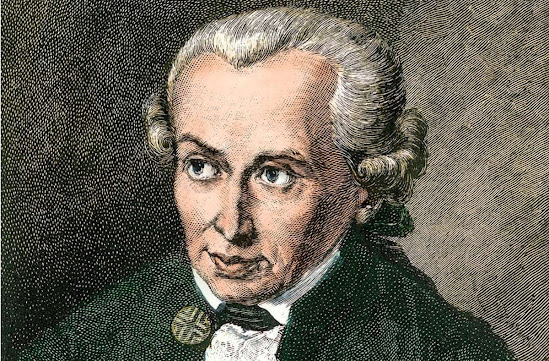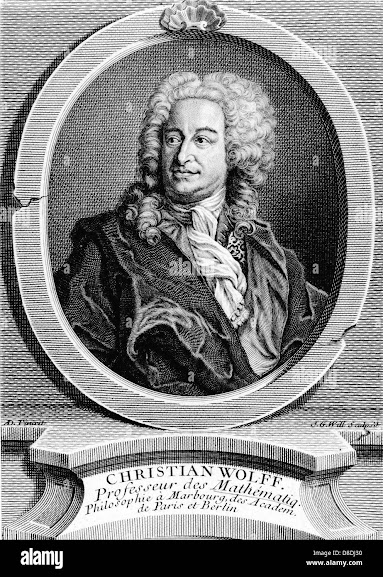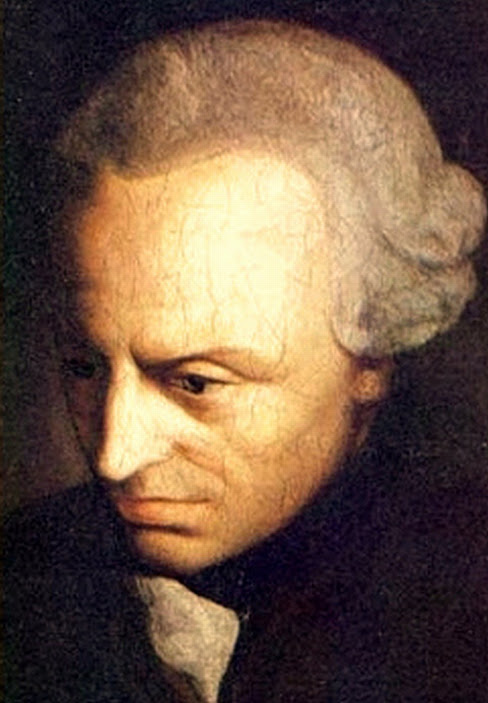An Overview of Kantian Philosophy Part I - Ch. 13 Philosophy: A Historical Survey With Essential Readings
This post takes an overview of some of the basics of Kantian philosophy from the theoretical side of things. Kant is one of the last Rationalist thinkers before the breakdown of the Rationalist school in the 19th Century, with a wave of anti-rationalist thinkers following, such as Schopenhauer, Nietzsche, Marx, and others. It seems clear to me that the same philosophical question is at the center of Kant's work as has been the impetus for philosophy since the beginning in Ancient Greece, "What are things?". Kant is of course influenced by Humean skepticism into thinking that to know the essence, or nature, of things indirectly is not to really know them at all with certainty. I will still side with Aristotle, and hold to the existence of immaterial essences in things and the natural faith in the intelligibility of being that allows one to acknowledge the realm of the metaphysical. To do otherwise, to deny the natural act of faith in being, is in my opinion, to fall into a complete skeptical absurdity.
 |
| Immanuel Kant (1724 - 1804) |
Kant's Background
Immanuel Kant was a German philosopher who spent his whole life in the small town of Kunigsberg. He was deeply influenced by his Pietist parents, but also by the education he received which was dominated at the time by the influence of the philosopher Christian Wolff. [Likewise since Kunigsberg was a part town, Kant would take advantage of the wide variety of people who passed through to expand his views on things.] 1 The Wolffian philosophy of the time treaded with certainty in the realm of metaphysics, even through its Rationalistic methods and outlook, something which Kant would come to reject upon his "awakening." Kant led a very disciplined and quiet life as a tutor and lecturer in Kunigsberg, producing many famous works of philosophy over his eighty year lifespan.
Setting Up the Kantian Problem - An Attempt to Save Rationalism
One of the paradoxes of Kant's day that sets up an impetus for his philosophy was the increasing understanding of nature through the growth of science, while at the same time being influenced by his Pietist upbringing and its emphasis of the freedom of moral actions and the sentiment of moral duty. The scientific consensus of the time was a type of mechanistic determinism, which would preclude such a free will involved in moral acting. 2 "The problem, then, was how to reconcile the two seemingly contradictory interpretations of events - one holding that all events are the product of necessity, and the other that in certain aspects of human behavior there is freedom." 3 Another problem Kant saw was a certain type of "dogmatism" within the Rationalist tradition, dealing with the abstractions of human consciousness rather than the empirical sciences. Thus he began to view their metaphysical speculations as being deficient at a certain point in his career. Which was correct, the metaphysical conclusions of the Rationalists or the empirical growth of the sciences?
 |
| David Hume (1711 - 1776) |
David Hume made things more complicated when he seemingly showed that even science attempts for untenable metaphysical conclusions, as the past and present cannot speak about the future. 4 Kant set out then to see just what the limits of philosophy were in relation to metaphysical knowledge. Whether from scientific or Rationalist methods, what really can man know? What are the limits of human knowledge? It is possible to know reality in itself? 5 "Kant, therefore, sought to build on what he thought was significant in both rationalism and empiricism and to reject what could not be defended in these systems. He did not simply combine the insights of his predecessors but rather embarked on a genuinely new approach, which he called critical philosophy." 6
Hume Waking Kant From His Dogmatic Metaphysical Slumber
While Kant began in the Rationalist school of Christian Wolff, upon encountering the skepticism of Hume, he turned away somewhat from his original thoughts, and sought to find some type of synthesis between empiricism and rationalism. Hume had convinced him that no experience of the past or the present could guarantee metaphysical or universal conclusions because experience is always an inductive one of a particular thing, not the metaphysical essence of things. This was certainly a break from thinkers like Descartes, who proceeded to many metaphysical truths as conclusions of realities experienced in consciousness. Kant did not follow Hume completely, though, as Hume can lead into a full blown skepticism of reality. Was there some way forward for human knowledge, neither dogmatic nor completely skeptical? 7 Was there a way in which man could possibly know truths of "pure reason," i.e. metaphysical truths? Following Hume, experience is not capable of talking about universal laws or natures because experience hasn't encountered all situations or things. These would have to be truths known a-priori, somehow given or present before experience, as experience itself could not possibly generate such truths.
 |
| Christian Wolff (1679 - 1754) |
It is this insight regarding a-priori truths that Kant seeks to figure out what Hume could not. He says that even though knowledge may begin with experience, truth is revealed as having already been part of conscious experience. Experience reveals what was already present there all along. For example, that 5 and 5 make 10, is a truth which was already and always present in the structure of experience, yet not generated by experience, but revealed. We perceive the laws of cause and effect and the connections between things because our mind is ordered to work through rational judgment. 8 This, for Kant, is to understand that the structure of the mind and perception are themselves a priori modes of knowing and truth. More specifically, he is interested in what are called "synthetic a priori" truths, but this will need to be understood in context.
Analytic and Synthetic Judgments
Like all philosophy, the fundamental question Kant is wrestling with is how we know what things are. For the Rationalist this is especially hard because one must come to a knowledge of what things are without having as much recourse to the senses. Fundamentally, for Kant, the what-ness of things is determined by the act of judgment in the mind which combines together a subject and a predicate. This happens in different ways though, taking into consideration four fundamental categories that he recognizes; analytic judgments, synthetic judgments, a priori, and a posteriori.
Analytic judgments are those statements in which the predicate is clearly contained in the universal notion of a subject ... it could not be otherwise because it is so fundamental to human experience and perception. For example, "A triangle has three sides." is an easy analytic statement in that, by definition, a triangle will always have three sides or it will not be a triangle. 9 "To deny an analytic judgment would involve a logical contradiction." 10 You don't need to experience many examples of triangles to know that all triangles have three sides, it's implied in its nature. On the other hand, there are synthetic judgments. Synthetic judgments are statements in which a predicate is said to be part of a subject, but not in a necessary and universal way, rather in a singular and experiential way, at least at first. (Until one is able to witness enough examples to begin to universalize it as a larger truth.)
A priori refers to a truth which is built into the nature of something, not requiring experience to apprehend. A posteriori is a truth which is attained through experience of something over time and through many examples. It is clear then that all analytic truths are known a priori, that is, immediately. On the other hand, synthetic truths are usually a posteriori because they require multiple encounters and experiences. But are all synthetic truths a posteriori? This bothered Kant as it seemed that there was another category of truth in his awareness, that of a synthetic a priori truth. 11
A Copernican Turn Toward the Subject
If Hume was right, to make such an synthetic a priori judgment one would need to have experienced every version of example of a particular subject to be sure that the predicate was really universal and necessary. Yet Kant can't help but see that, while we cannot possible do this through experience, we are geared naturally to make these learned judgments about the universal nature things ... and that these judgments actually work out in real life. The sciences show us that such judgments are dependable, or whole enterprise wouldn't work. How does one get around this problem then?
Well, Hume's model of knowledge assumed that everything in the mind was directly from experience. The mind reflected the experiential knowledge of the senses. Empirical objects are primary and the mind's ideas are always secondary. But what if this was somehow inverted? Just as man used to think that earth was the center of the universe and came to realize that actually the sun way, could it be possible that the mind is somehow primary to the shape and character of the reception of empirical knowledge? Does the mind shape our experience of the world? 14
"...Kant saw the mind as an active agent doing something with the objects it experiences. The mind, Kant says, is structured in such a way that it imposes its way of knowing on its objects. By its very nature the mind actively organizes our experiences. That is, thinking involves not only receiving impressions through our senses but also making judgments about what we experience. Just as a person who wears colored glasses sees everything in that color, so every human being, having the faculty of thought, inevitably thinks about things in accordance with the natural structure of the mind." 15
Categories of the Human Mind
What is it then that the mind brings to bear on the very structure of experience? Well first there are two fundamental intuitions that color the sensual reality, space and time. We cannot but help perceive reality as being spatial and likewise temporal in nature. That isn't something learned, but is present in every experience. 16 Likewise there are other fixed aspects of human perception, that things have "...quantity, quality, relation, and modality. When we assert quantity, we have in mind one or many; when we make a judgment of quality, we make either a positive or a negative statement; when we make a judgment of relation, we think of cause and effect, on the one hand, or of the relation of subject and predicate, on the other; and when we make a judgment of modality, we have in mind something that is either possible or impossible." 17 Finally, the mind is that which operates by judgment, trying to make sense out of the varied sense experiences to create an intelligible and unified world.
This also implies that the self is a type of unity which operates all of these functions together to produce the content of living experience. This is the "self" or the "transcendental unity of apperception." Like things-in-themselves we likewise cannot directly know what the self is, only that it is necessary for unifying the experience of the world into a coherent picture.
The Phenomenal and the Noumenal
Thus we begin to see the limitations of human knowledge. If things-in-themselves, or the most real world, the world of concepts or essences, is only known through the physical and empirical world, and the physical world is only know through the structures of perception of the knower, then there is an unbridgeable barrier between the nature of reality, and our perceptions of reality. This is the distinction between the phenomenal and the noumenal. The phenomenal is that which we perceive through the lenses of the mind, while the noumenal world is that which we never have true access to as it refers to things-in-themselves. 18
The New Role of Metaphysical Truths - The Self, the World, and God
As mentioned before, Kant recognizes that as human beings we try to unify and makes rational sense out of our experience of the world. Even though we have no experience of these explanations of unity, as they are produced by pure reason and not perception, we also cannot be indifferent to them. These ideas are called "transcendental" because they go beyond what we can experience or justify. The first was previously mentioned, that is the unity of the self as the one experiencing. The mind takes its structures to unify the perceptions of events, bodies, and thought in a singular self, though this self cannot be experienced. Secondly, Kant says that the idea of a unified world outside of ourselves is likewise a concept that we cannot experience directly, as it part of the noumena, though we posit it because it helps us make sense of experience and unify it. Thirdly, Kant says that God is posited to give the universe a necessary cause to all the contingent beings and realities that take place.
Kant is clear that he doesn't think we can know the existence of these realities, all we can know is that we have them and use them to regulate and unify our experience. He criticizes previous Rationalists for their attempts to make the leap from a metaphysical idea to the reality of that idea. 19 "The function of these ideas is simply and solely regulative. As regulative ideas they give us a reasonable way of dealing with the constantly recurring questions raised by metaphysics." 20
To go further, Kant thinks that because these ideas are transcendental, generated by pure reason and not experience, that we cannot even apply the usual categories of space, time, cause, or effect to them. They are beyond the limits of reason. But, wait, what about scientific laws? Well, Kant holds that because we can experience the individual examples of these laws, and because we all share a similar nature of perception of the world, that we can be more confident in positing the existence of such empirical laws. We can share a common unified experience of science ... but we cannot indulge such a desire for higher and higher rational unity when we leave the realm of perception altogether. 21
"Whenever we try to discuss the self, the universe, or God as though they were objects of experience, the inability of the mind ever actually to do so is showed by what Kant calls the antinomies into which we fall." 22 What are antinomies of reason? Well essentially Kant is saying that when we get into the metaphysical, beyond the experiential realm, we can argue equally both sides of the existence or non existence of those realities, whether that is the finitude or infinitude of the universe, the existence of immaterial essences, the reality of cause and effect, or the existence of god.
What then is the use of such ideas or truths? Well, though they cannot be proven true or false, they can be used to govern and regulate man's experience and social community. To believe that man has free will is impossible to prove, yet the idea can be helpful in regulating the morality of a society, for example. 23
Implications of Kant's Epistemology
One of the major implications of Kant's epistemology is his belief that the three Medieval proofs for God's existence are hence invalidated. Traditionally there had been the Ontological argument from Anselm (and other Rationalists), the Cosmological argument from Aquinas, and the long held Teleological argument. What happens is that since Kant puts the metaphysical beyond the reach of reason by pointing out that we have direct experience of God, but also by claiming that our categories of knowledge completely breakdown in the face of realities which are noumenal, that therefore we cannot use reason to extrapolate to any logical conclusion regarding such ultimate concepts. The metaphysical world is completely other, completely unknowable, and not necessarily analogous to the perceptual world. Now Kant does not give up completely on the idea of God's existence, rather he is going to reach God from another path in his moral philosophy. 24 So stay tuned ...
In part II of this post I will get into the practical and moral side of Kant's philosophy.
-------------------
1 - Fieser, James and Samuel Stumpf. Philosophy: A Historical Survey With Essential Readings. Ch. 13 Immanuel Kant. Pg. 301.
2 - 302
3 - 302
4 - 303
5 - 304
6 - 304
7 - 304
8 - 305
9 - 306
10 - 306
11 - 306
12 - 307
13 - 307
14 - 308
15 - 308
16 - 309
17 - 309
18 - 310
19 - 311
20 - 311
21 - 312
22 - 312
23 - 312, 313
24 - 313






Comments
Post a Comment